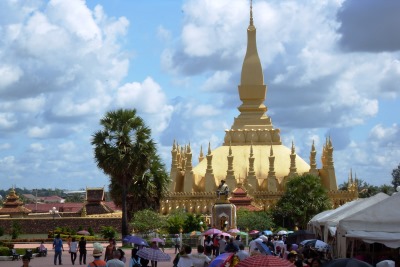
Eyewitness - Laos
excerptsMy first recollection of Laos was as a schoolboy stamp collector in 1954. (I thought it was a strange name for a French Indochina territory as it was listed then).
But that all changed dramatically when I went there in January 1969 as a VSO volunteer. After spending 6 years there my connections with that small land-locked country have continued. Those experiences of 50 years ago have had a profound effect on me. It has been hard to select a few excerpts that capture the essence…

Vientiane was a rather sleepy capital city. At that time, it had perhaps a hundred thousand inhabitants, but the population was increasing daily as tribal people, displaced from their villages by the war, arrived. The traffic was light with no buses, few taxis and many samlors – tricycles in which the passengers are seated behind the muscular cyclist. There were three sets of traffic lights, lots of dust along the streets and rather smelly open drains that bred mosquitoes. Many of the streets were lined with flame trees, and older houses from the French colonial era added charm.
The city sits on the outside of a bend in the massive Mekong River, with Thailand on the other bank. In the dry season the river retreats to the Thai bank, revealing extensive sandbanks. When in flood the raging waters are formidable, rising ten metres or more and transporting many kinds of flotsam.
The ever-present backdrop to my time in Vientiane was the Vietnam War, which spilt over into Laos. We often discussed the ethics of the war, the suffering and plights of the many refugees who fled the fighting, and the unfolding human tragedy.
The missionaries had been planning to build a recording studio at the Laos Bible Training Center (LBTC), and they sought my help because of my radio connections. A lot of help had already been gathered from missionaries at the Far East Broadcasting Company (FEBC), who were in the Seychelles setting up the new shortwave radio station there. The contact was via ham radio links. Once the studio was built and soundproofed it was time to install the equipment, and this was how I got my first hands-on involvement.
One night, my good friend Don Scott and I were busy soldering wires and connecting everything together, and I was lying flat on my back on the control-room floor. Suddenly, I had a sort of “Damascus Road” experience.
“Frank! Why did you come to Laos? And why radio?” (It was God on the line…)
Pause.
“Because there is no one to run this studio. I want you to do it!”
Suddenly, it all became crystal clear. I told Don, and he was delighted to know that someone would be coming to run the studio.
It also answered the big question which accompanied my openness to God about my calling. When I told my Mum and Dad they were, understandably, not too happy at the thought of my going back to Laos again so soon after returning home, but they also wanted me to do what God had planned.
So it was that, when I left to go back to the UK at the end of my extended term, in early December 1970, the pain of parting was offset by the almost certain knowledge that I would soon be back.
During my years working in the recording studio, I had been privileged to witness the impact that the shortwave radio broadcasts from FEBC in Manila were having on the Hmong people. They were known to us as Meo in those days, and they lived in the mountains of northern Laos.
The only address for the radio station given on air was ‘Post Box 3’, so quite often a delegation of Hmong men would arrive in Vientiane in search of the source of the radio programs they listened to. They were sent by families in their village, who had been listening to the broadcasts and now wanted to believe. This would often result in five, ten or more families entering the Christian faith.
After days of listening and subsequent discussion, they would bring out their demon paraphernalia, fetishes and other symbols of the evil spirits that had dominated their lives and burn them together as an outward demonstration of their new faith in Jesus. It was also a clear and open rejection of the demons that had held so much control over them. Such demonstrations of faith also had a knock-on effect as they controlled opium addiction, became healthier, planted new cash crops and began to prosper. This did not go unnoticed in their communities: it was a visible sign of transformation in action.
One evening I went to one of my favourite Chinese noodle shops in Chinese cinema street, the Piu Ky. Seating was limited, so I sat across from a young fellow who was also enjoying his fer. We got talking and he discovered I was English. He asked me if I knew of the English radio program every night on LNR. He said he enjoyed listening to it. I soaked all this up, but really, it was getting a bit heady, especially when I told him it was my program. He nearly fell off his stool. It was a valuable insight, but it also got me thinking about building bridges, breaking down barriers to belief, and all sorts of related issues that should concern the Christian communicator.
I learned a very valuable lesson as a broadcaster in Laos: as Christians in media ministry we learn to work within whatever parameters we are given, including situations that are not sympathetic or even hostile. If we are not allowed to do what we want, we do not give up or walk away. Instead, we experiment to find out – creatively – how much the local context can take and then make the most of that.
Being attached to LNR also meant that we came under the Ministry of Information and had privileged access to events of national importance. Radio often needed to be in the front line. Sometimes our involvement was of a practical nature, like setting up equipment, but other times it was merely a social venture which we as foreign aid workers needed to attend. This gave us some unusual encounters.
One of the most memorable and humorous of these was when Chris and I accompanied Brian Denney, one of our BBC superiors to Luang Prabang, the then royal capital, for the annual Pi Mai (New Year) celebrations. There were several special events planned for that week, one of which was a special beauty pageant hosted by the Cercle de Luang Prabang. Chris and I wore our lounge suits as specified, but Brian had mistakenly packed his white dinner jacket. When we entered this prestigious club, we were shown to our seats at a table just in front of the main stage. Immediately, deep anxiety overtook Brian, as he thought he had been mistaken for the British ambassador. Indeed, we looked on as the Crown Prince arrived and seated himself at the table next to ours.
We consoled Brian. “Look, we can’t do anything about it now. Just pretend you are the ambassador!”
The charade was put to the test when the pageant started and each of those sitting in the front was invited onto the stage by one of the beauties. We had to perform with them as partners some of the exotic Lao dances, including the famous Lamvong, twirling our hands gracefully as we paraded around in a circle. With that over, we returned to our seats and awaited the judges’ verdict. To my surprise it was my dance partner, Miss Lao Airlines, who was voted the queen.
For living space, I was offered a single-room apartment on the small WV compound where Don, his wife Nola and their family lived. They were a lot of fun, especially their four children: two older girls and twin boys, Jeff and Mark. The arrangement worked just fine for me and I was glad to join in the life of the family and play with their four children. For the first time in my life I became “Uncle Frank”.
The day began with breakfast, which was always a challenge as I became accustomed to new foodstuffs while experiencing the drama of eating in the company of small children.
As an early bird I normally have no trouble getting started at the beginning of the day, but it soon became apparent that I was struggling. In fact, I often felt quite woozy in the mornings as soon as I woke up. The children even made fun of me when I came down to breakfast.
I also realised that there was a strange smell in my room. It was a distinctive sweet, sickly smell. Some mornings it was stronger than others. I became curious.
At the far end of my room opposite the door was a window with iron bars and a mosquito screen. The window did not afford a view because it was backed up against another building. But as I looked down through the iron bars to the floor below I could make out just enough to see men sitting around a small flame with their pipes, smoking.
Opium addicts. It was their smoke that was wafting upwards into my bedroom – and I was getting their leftovers. My Canadian friends had a good laugh when I told them. I also told my Lao friend, Phoxay, who was a policeman, and he came around to check out my story. Opium dens were illegal, so he soon got onto the case – and the opium fumes went away.
It was not long before Hennie and I were discussing the possibility of marriage. But first we needed to get engaged, and for that we came up with a rather novel plan. We would ride out on the sandbank to the middle of the Mekong River on my Yamaha trail bike. When we got there, there was no shade to be had from the burning sun, so I went on the hunt for some driftwood that we could use to set up as a bivouac using our towels. Bringing back a banana tree log on my shoulder, I threw it down on the ground, and out slithered a krait – one of the deadliest snakes around! We survived.
After going through the hoops of mission protocol for marriages on the field (something we had been blissfully unaware of), we were finally able to plan for a June wedding. However, again there were complications. Hennie’s flatmate, Hazel, was very sick and had to go away to hospital in Bangkok. It was customary to take a friend because nursing care was limited, so Hennie and Doris Whitelock, our Scottish neighbour, went with her, delaying our wedding plans once again.
In the end it all came together, even though we had to arrange everything ourselves. We had to find a bridesmaid (Corrie from Thailand), and flowers in season (purple chrysanthemums, although this was not a good colour according to our Lao friends). For legal reasons, we had to go to Thailand for a civil wedding and then have a church wedding back in Laos. So we had two wedding days – one in May and another in June.
